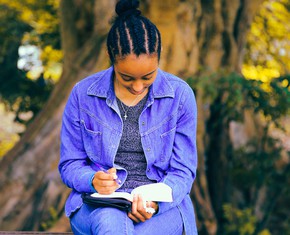The views expressed in our content reflect individual perspectives and do not represent the authoritative views of the Baha'i Faith.
Since birth, we have all taken part in the never-ending process of learning about ourselves and who we want to be.
In childhood and youth, our search for our true identity usually reaches its peak, but it never really stops. We seek self-knowledge constantly—it seems built in to our basic humanity. As Aristotle said, “Knowing yourself is the beginning of all wisdom.”
Ralph Ellison wrote “When I discover who I am, I’ll be free.” In Alice in Wonderland, the author Lewis Carroll asked “Who in the world am I? Ah, that’s the great puzzle.”
So when we look for ourselves, who do we expect to find? We usually find ourselves by beginning to understand our particular type of personality, our interests, our occupation, our sexual orientation, our relationships including marriage and children, our political views, our religious and spiritual avocations, and many more.
But in a way, these are all labels—not our true identities. In the crucial moments of life, and at the hour of death, all of these labels give way to something deeper and more profound.
So who are we really? All religions say we are spirits with bodies.
To discover our spiritual identities, we all undertake one of two kinds of searches: to find that inner meaning, that core, in ourselves and in our lives, and then, to find a physical reality that we can fit into society.
That inner core is our human spirit:
But it is a spirit in man, And the breath of the Almighty gives them understanding. – Job 32:8
The spirit of man is the lamp of the Lord, Searching all the innermost parts of his being. – Proverbs 20:27
Due to humans’ dual spiritual and animal natures, both good or very good, or bad, or very bad, possibilities exist in humans. God is known through His attributes which are all light upon light; they are virtues like All-Merciful, All-Kind, All-Knowing etc. and not faults. – Qur’an 51:56.
The Baha’i teachings say this—and much more—about the human spirit:
In the world of existence there is nothing so important as spirit, nothing so essential as the spirit of man. The spirit of man is the most noble of phenomena. The spirit of man is the meeting between man and God. The spirit of man is the animus of human life and the collective center of all human virtues. The spirit of man is the cause of the illumination of this world. The world may be likened to the body; man is the spirit of the body, because the light of the world is the human spirit. Man is the life of the world, and the life of man is the spirit. The happiness of the world depends upon man, and the happiness of man is dependent upon the spirit. The world may be likened to the lamp chimney, whereas man is the light. Man himself may be likened to the lamp; his spirit is the light within the lamp. – Abdu’l-Baha, The Promulgation of Universal Peace, pp. 239-240.
The Baha’i writings also describe the human spirit as “the rational soul.” Abdu’l-Baha said this when describing the stations of the divine prophets and messengers:
The second station is that of the rational soul, which is the human reality. This also has a beginning, and the Manifestations of God share it in common with all humanity. – Some Answered Questions, newly revised edition, p. 172.
We each search for our soul, that unique part of us that defines who we are, that “spirit within us” that makes us different than everyone else on the planet, even though we have innumerable things in common.
We all have a soul, the human spirit, in common too.
That’s one reason why Baha’is try to stay clear of controversies about identity. Each person’s identity is the sum of many individual and very personal decisions. Our identities have deep societal implications, and laws and policies can unify or divide. It’s not easy to find one’s identity as a human being, so we all need to go beyond simple tolerance–mere tolerance of diversity was relegated to the dustheap of history years ago. Acceptance, cooperation and unity are called for now.
Just because civil laws change and evolve to legalize certain identity designations, Baha’is still view every human being as a unique and precious soul. That view means we must extend a hand, seek to understand and give aid, and offer our selfless service to humanity, no matter what color or gender or viewpoint:
Inasmuch as all were created in the image of God, we must bring ourselves to realize that all embody divine possibilities. If you go into a garden and find all the flowers alike in form, species and color, the effect is wearisome to the eye. The garden is more beautiful when the flowers are many-colored and different; the variety lends charm and adornment. In a flock of doves some are white, some black, red, blue; yet they make no distinction among themselves. All are doves no matter what the color.
This variety in forms and colorings which is manifest in all the kingdoms is according to creative wisdom and has a divine purpose. Nevertheless, whether the creatures be all alike or all different should not be the cause of strife and quarreling among them … Then will the world become as one great garden of flowering humanity, variegated and multicolored, rivaling each other only in the virtues and graces which are spiritual. – Abdu’l-Baha, The Promulgation of Universal Peace, p. 113.
















Comments
Sign in or create an account
Continue with Googleor